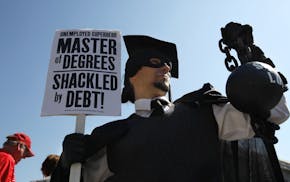Listen closely and you can already begin to hear it stirring: The collective sound of jaws hitting the floor as companies reveal the take-home pay of their top executives.
The din may be especially loud this year as executives continue cashing in on stock options and shares awarded between October 2008 and September 2009, when stock prices seemed locked in a downward spiral. Standard & Poor's has estimated that the value of stock and options awarded at the companies in the S&P 500 has risen by more than $3 billion since then.
Meanwhile, big companies are lobbying hard to block a new rule that would require disclosure of median worker pay alongside the pay of top executives. The Securities and Exchange Commission has been tasked with the thankless job of formulating the new rules on determining median worker pay, and it's already missed two deadlines. Last week the agency said the new rules will come by June of this year.
It's a measure that deserves to be repealed. Shareholders have consistently rejected efforts to force companies to compute the compensation of "average" employees because they know that the ratio is meaningless. The only reason to require this kind of disclosure is to embarrass top executives. And that makes it redundant because there's already enough embarrassing information in most pay disclosure documents.
Don't get me wrong: Some executives deserve what they get, especially those who've been held to high standards -- and delivered for shareholders -- over a long period.
Then there are those companies where directors contort themselves to insulate executives from the everyday risk that employees and shareholders are exposed to.
Often, it's not the big number that's so galling, but all the little things done to ensure that executives always seem to do OK.
Case in point: the Minneapolis-based firm formerly known as Fair Isaac Corp. It now goes by the name of FICO, and it's best known as the company that helped turn consumers into a number: their credit score.
The debt bubble was good for FICO, with sales doubling between 2002 and 2006. But it's struggled since then, having shed about a third of its employees. The most recent round of cuts came in February 2011, when FICO laid off 200 employees.
Coincidentally, that same month the company goosed the vesting schedule on thousands of shares of stock awarded to top executives two months earlier, at a price of $24.03. Instead of having to wait four years to claim those stock awards, they could do so in two. The same executives also received tens of thousands of stock options, but those vested on a normal four-year schedule.
A FICO spokesman defended the decision, noting that executives couldn't cash in unless the company met specific performance goals. "The whole idea of that new provision was that certain metrics had to be met," he said.
True enough. But FICO is late to the practice of attaching performance goals to stock awards, and by moving up the award dates it turned a long-term incentive into one that rewarded shorter-term performance.
And by February 2011, FICO was already almost halfway through its fiscal year, and executives surely had a pretty clear idea of how things were shaping up. Indeed, on the day that he announced the layoffs, FICO CEO Mark Greene told Wall Street that the company would have higher sales and profits than originally promised.
Guess what? He was right! Revenue in fiscal 2011 went up slightly for the first time since 2006, FICO's shares soared almost 60 percent, and executives reaped payouts of about $300,000 on those early stock gifts. In the final two months of 2011, FICO insiders sold 5.8 million shares. They bought none.
FICO is not one of those companies that gets shareholder activists in a lather. Last year, Greene ranked 45th in the Star Tribune's compensation survey. Compared with the outrages at some companies, early stock awards might seem trivial. But in FICO's case, the payouts are compounded by the millions doled out to two short-term hires that did not work out.
Former CFO Thomas Bradley lasted only 16 months in that role before stepping down, into a lower-paid job, for another nine months, but still managed to take home about $1 million in pay.
Jordan Graham did him better, collecting $1.5 million for nine months as president of FICO's consumer services division.
You'd think that a company that brands itself as a "leader in decision management" and trumpets its ability to transform business "by making every decision count" would do a better job hiring key executives.
Then again, it's not their money at risk. It's only shareholders'.
ericw@startribune.com • 612-673-1736

Wieffering: Time to get over debit card fees
For Thrivent and others, warnings were there

With billions in sales, some co-ops are big business
